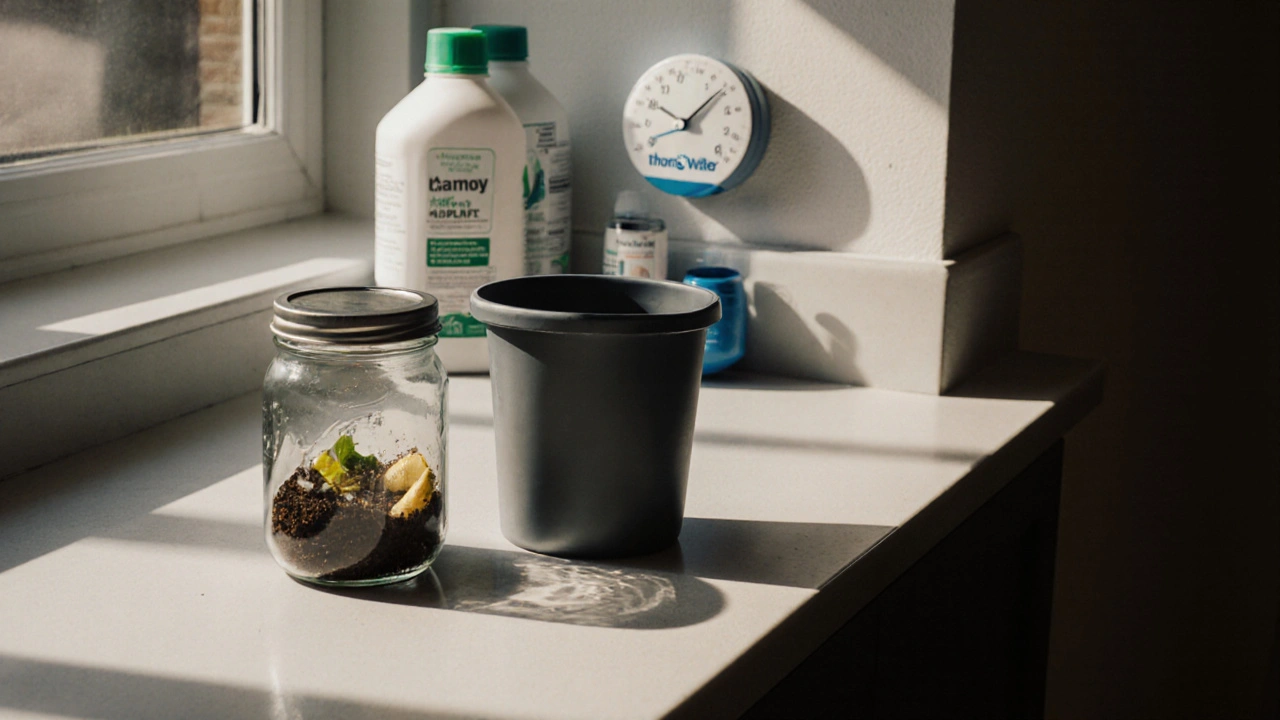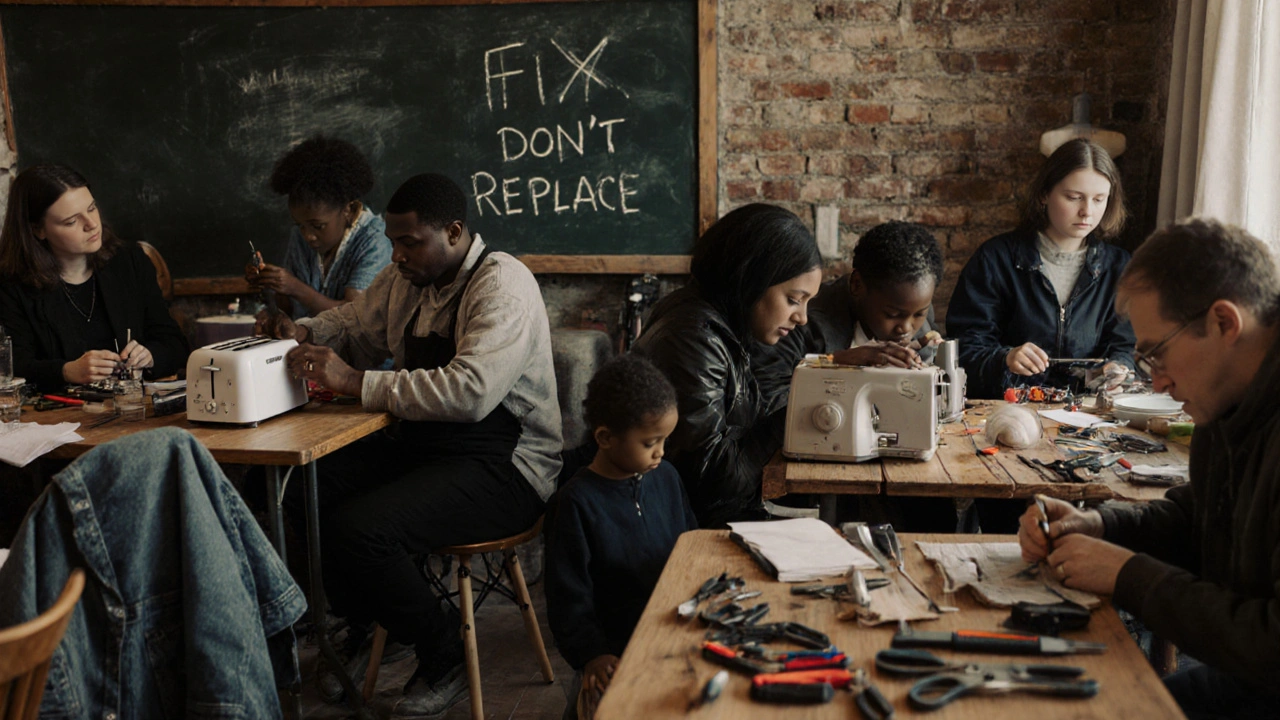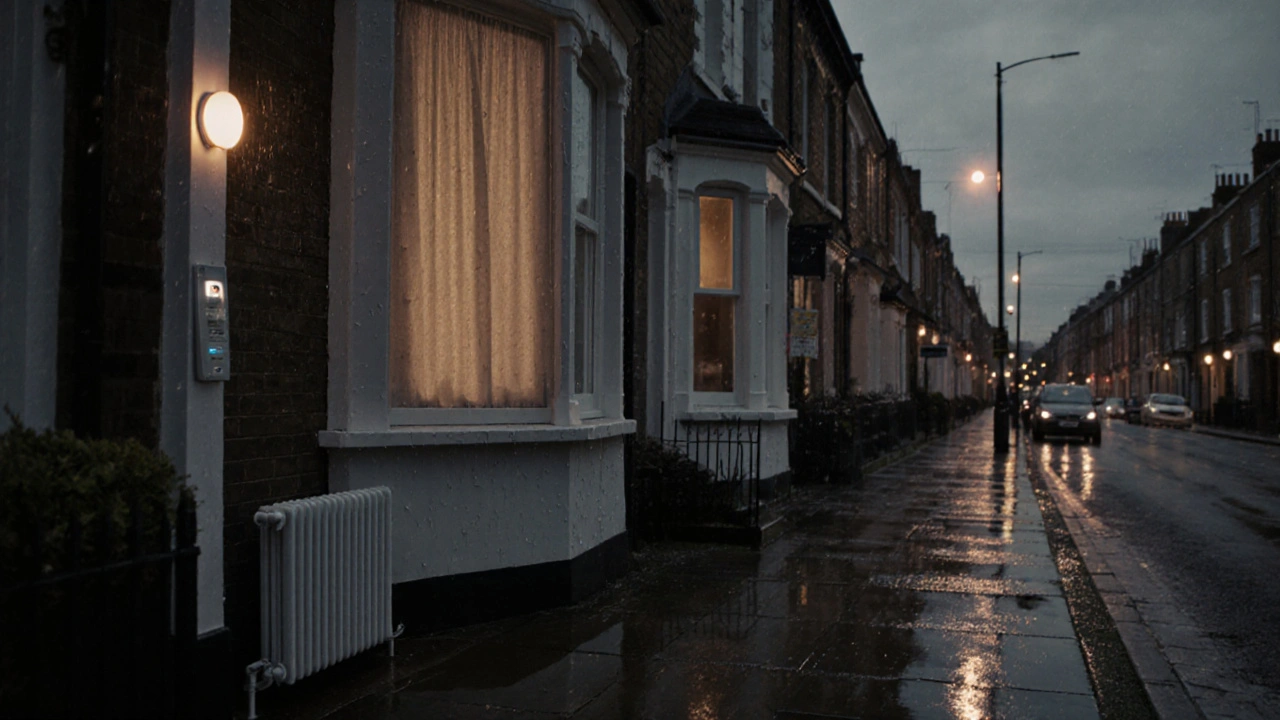London isn’t just getting busier-it’s getting hotter, wetter, and more expensive. The city’s average temperature has risen by 1.5°C since 1960, and extreme rainfall events have doubled in frequency over the last 20 years. If you’re paying your energy bill, watching your water meter, or filling up bin bags every week, you’re already feeling the cost of climate change. The good news? You don’t need to buy solar panels or go zero-waste overnight. Small, smart changes in how you use energy, water, and manage waste can cut your bills and your carbon footprint-right now.
Energy: Stop Wasting Heat Before It Leaves Your Home
London homes lose more heat than you think. The average household spends over £1,200 a year on heating, and up to 35% of that heat escapes through poorly insulated walls, windows, and roofs. You don’t need a full retrofit to fix this. Start with the cheapest fixes that give the biggest return.
Put thermal curtains on windows-especially ones facing north. They’re not fancy, but they can cut heat loss by 10-15%. Seal gaps under doors with draft excluders. These cost under £10 and pay for themselves in one winter. If you have an older boiler, check if you qualify for the London Energy Efficiency Fund. It gives grants up to £5,000 for low-income households to replace boilers or add insulation. Over 40,000 homes in Greater London have already used it.
Switching to a smart thermostat like Tado or Hive isn’t just trendy-it’s practical. People who use them save 10-12% on heating bills by automatically lowering temperatures when no one’s home. Set it to 19°C during the day and 16°C at night. That’s warm enough to be comfortable, cool enough to save money. And don’t forget: turning radiators off in unused rooms saves more than you’d expect. A 2024 study by Imperial College London found that households that did this reduced energy use by 18% in just three months.
Water: London’s Supply Isn’t as Safe as You Think
London gets its water from rivers and reservoirs that are drying up faster than they refill. The Environment Agency says the city’s water demand will outstrip supply by 2040 if nothing changes. Right now, the average Londoner uses 145 litres of water a day-higher than the UK average. Most of that goes down the drain without thinking.
Install a shower timer. Yes, really. A five-minute shower uses about 45 litres. A ten-minute one? 90. That’s half your daily allowance in one go. A simple £15 timer helps you cut shower time without feeling deprived. Swap your old showerhead for a water-saving model-they’re £20-£30 and reduce flow by 40% without losing pressure. You’ll still feel clean, but you’ll use less water and less energy to heat it.
Don’t let taps drip. A single leaky faucet can waste 5,000 litres a year. That’s enough to fill a small swimming pool. Check under sinks monthly. If you have a cistern toilet, put a displacement device-like a water-filled bottle-in the tank. It cuts flush volume by 1-2 litres per use. Multiply that by five flushes a day, and you’re saving over 1,800 litres a year. Thames Water offers free water-saving kits to residents: request one online and they’ll send you a flow regulator, shower timer, and leak detector for free.
Waste: The Bin You Don’t Fill Is the One That Saves You Money
London produces over 10 million tonnes of waste every year. Only 33% gets recycled. The rest goes to landfills or incinerators, both of which cost the city millions in fees-and pollute the air you breathe. But here’s the truth: your bin isn’t your enemy. Your habits are.
Start composting food scraps. You don’t need a garden. A countertop compost bin like Lomi or a simple worm farm costs under £50 and turns peelings, coffee grounds, and eggshells into soil in weeks. If your council doesn’t collect food waste (many do now-check your borough’s website), drop it off at one of London’s 120 community compost hubs. The East London Compost Project alone takes in 15 tonnes a month from residents.
Buy in bulk. Not just for cereal. Detergent, shampoo, cleaning products-all available in refill stations across the city. Stores like Bulk Market in Hackney, The Refill Shoppe in Islington, and Zero Waste Co-op in Brixton let you bring your own containers. You save 30-50% per item, and eliminate plastic packaging. One family in Camden switched to bulk shopping and cut their household plastic waste by 80% in six months.
Fix, don’t replace. A broken toaster? A ripped jacket? A wobbly chair? London has over 150 repair cafes where volunteers fix things for free. The first Saturday of every month, you can take your gadgets, clothes, or furniture to places like the Hackney Repair Café or the Southwark Fix-It Fair. Last year, they saved 2,300 items from landfill. That’s not charity-it’s common sense.

What Works in London? Real People, Real Results
Emma, 58, lives in a 1930s terraced house in Lewisham. She didn’t have money for insulation, so she used free advice from the London Climate Action Network. She sealed windows, switched to LED bulbs, installed a shower timer, and started composting. Her energy bill dropped by £320 in the first year. Her bin went from full every week to half-full every two weeks.
James, 32, works in tech and used to order takeout daily. He started using the Too Good To Go app-where restaurants sell unsold food at half-price-and bought a reusable coffee cup. He now spends £25 a week on food instead of £70. He also joined a local tool library. He borrowed a pressure washer to clean his patio, a ladder to fix a gutter, and a drill to build a shelf-all for free.
These aren’t extreme lifestyles. They’re simple adjustments that add up. You don’t need to be perfect. You just need to start.
What to Do Next: Your 7-Day Sustainable Living Starter Plan
- Day 1: Check your energy bill. Write down your current usage and cost. Compare it to the average for your area (find it on your supplier’s website).
- Day 2: Buy a £10 draft excluder and seal one door. Feel the difference in temperature.
- Day 3: Request a free water-saving kit from Thames Water. It arrives in 3-5 days.
- Day 4: Download the Too Good To Go app. Buy one meal from a local café instead of ordering delivery.
- Day 5: Find your nearest repair café. Mark the next date on your calendar.
- Day 6: Buy a small compost bin. Put your fruit peels and coffee grounds in it.
- Day 7: Turn off one radiator in an unused room. Leave it off for a week. Note how you feel.
That’s it. Seven days. No big purchases. No lifestyle overhaul. Just seven small steps that lead to real savings and less waste.

Frequently Asked Questions
Is sustainable living in London expensive?
Not if you start small. Most of the biggest savings come from free or low-cost actions: sealing drafts, fixing leaks, composting, and buying in bulk. The average household saves £400-£700 a year by making these changes. Grants and free kits from the council and Thames Water mean you don’t need to spend upfront.
Can I really make a difference as one person?
Yes. If 10,000 Londoners each save 100 litres of water a day, that’s 1 million litres saved daily. If 5,000 households compost, they keep 15,000 tonnes of waste out of landfills every year. Individual actions scale up fast. You’re not just saving money-you’re helping the city adapt.
What if my landlord won’t let me install anything?
You don’t need permission for most changes. Thermal curtains, draft excluders, shower timers, compost bins, and refillable containers are all portable and removable. Even switching off radiators or shortening showers doesn’t require approval. If you’re worried, focus on habits over hardware-they’re just as effective.
Are there any government schemes I can use?
Yes. The London Energy Efficiency Fund gives grants for insulation and boiler upgrades. Thames Water offers free water-saving kits. Many boroughs provide free compost bins or food waste collection. Visit your borough council’s website and search for ‘climate action’ or ‘energy support’-you’ll find local help you didn’t know existed.
How do I know if my efforts are working?
Track your bills. Compare your energy and water usage month to month. Use apps like OVO Energy or Thames Water’s online portal to see your daily usage. If your numbers drop without changing your lifestyle, you’re doing it right. Also, notice how often you fill your bin. Fewer bags = fewer trips to the curb = less waste.
Next Steps: Where to Go From Here
Once you’ve done the 7-day starter plan, you’ve built momentum. Now it’s time to go deeper. Join a local climate action group-many boroughs have them. Attend a free workshop on home energy audits. Try a meat-free Monday. Use public transport one extra day a week. The goal isn’t to be perfect. It’s to be consistent. Every small choice adds up. And in a city like London, where millions live side by side, small choices become powerful ones.
